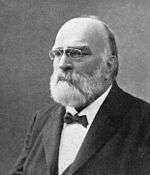Nils Christoffer Dunér
| Nils Christoffer Dunér | |
|---|---|
|
Nils Christoffer Dunér (1909) | |
| Born |
21 May 1839 Billeberga, Malmöhus län |
| Died |
10 November 1914 (aged 75) Stockholm |
| Nationality | Swedish |
| Fields | astronomy |
| Institutions | Uppsala University |
| Alma mater | Lund University |
| Notable awards | Rumford Medal in 1892 |
Nils Christoffer Dunér (Billeberga, Malmöhus län 21 May 1839 – Stockholm 10 November 1914) was a Swedish astronomer. His parents were Nils Dunér and Petronella (née Schlyter).[1]
Dunér received his doctorate from Lund University in 1862, was observer at the observatory there from 1864 and Professor of Astronomy at Uppsala University from 1888.
He was awarded the Prix Lalande in 1887[2] and the Rumford Medal in 1892. The crater Dunér on the Moon is named after him. At Svalbard, Dunérfjellet on Svenskøya, Dunérbukta in Sabine Land, and Kapp Dunér, the western point of Bjørnøya, are named after him.[3][4][5]
References
- ↑ Hockey, Thomas (2009). The Biographical Encyclopedia of Astronomers. Springer Publishing. ISBN 978-0-387-31022-0. Retrieved August 22, 2012.
- ↑ "Paris. Academy of Sciences, December 26, 1887". Nature. 37 (949): 239–240. 5 January 1888. doi:10.1038/037239a0.
- ↑ "Dunérfjellet (Svalbard)". Norwegian Polar Institute. Retrieved 4 June 2014.
- ↑ "Dunérbukta (Svalbard)". Norwegian Polar Institute. Retrieved 4 June 2014.
- ↑ "Kapp Dunér (Svalbard)". Norwegian Polar Institute. Retrieved 4 June 2014.
External links
This article is issued from Wikipedia - version of the 10/4/2016. The text is available under the Creative Commons Attribution/Share Alike but additional terms may apply for the media files.
